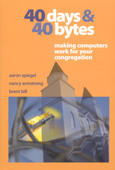This short life span [of a computer] is something that most congregations do not realise. They think the machine they buy will last forever. Well, it may, but it will not be useful forever. There is no such thing as eternal life for a personal computer. After the useful life of a machine has ended the most economical thing to do is get rid of it. That is not something that many congregations do. Instead, they tend to pass older computers along to junior staff members.
If you think about this, then you see that it is about the worst thing you can do to an older computer – or a junior staff person. An example of why this is a bad idea is obvious is we take the scenario of passing down the church business administrator’s three-year-old computer to the preschool administrator. Chances are you are doing this because the
 business administrator has outgrown the machine. It is underpowered or lacks the ability to run the most current operating system or business software. So why do you want to pass this machine to another person? All that does is move a marginal machine from a skilled user who has been able to massage it enough to keep it usable to an unskilled, or at least lesser skilled, user who will not be able to use it at all.
business administrator has outgrown the machine. It is underpowered or lacks the ability to run the most current operating system or business software. So why do you want to pass this machine to another person? All that does is move a marginal machine from a skilled user who has been able to massage it enough to keep it usable to an unskilled, or at least lesser skilled, user who will not be able to use it at all.Hardware is a commodity. Once it fulfils its useful life span, get rid of it! Or use it as a doorstop on the first warm day of spring. Yes, that goes against the grain in many congregations, where old, outcast stuff from furniture to computers is passed around until it ends up in the youth group room – as if they want it! This is one place where a congregation needs to act like a business. If you factor in the TCO [total cost of ownership], then at the end of three or four years the computer has paid for itself. It is time for a replacement.
From chapter 10 of 40 Days and 40 Bytes – making computers work for your congregation, published by Alban Institute 2004
No comments:
Post a Comment